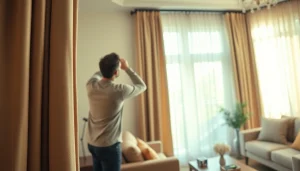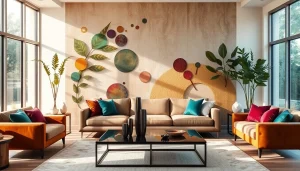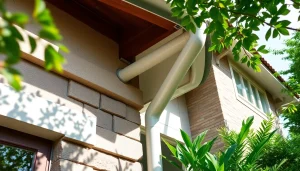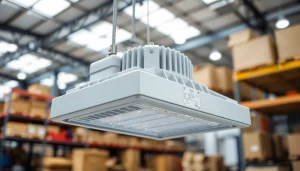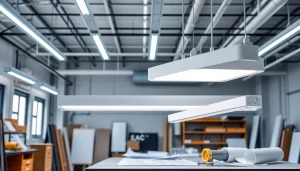Maximize Your Space with Stylish Sliding Partition Walls for Modern Living
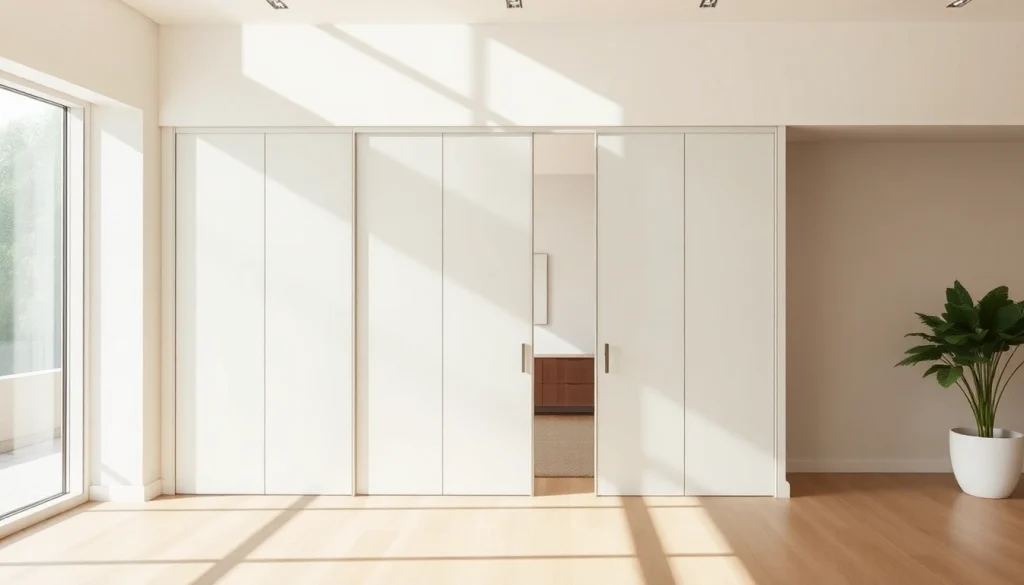
Understanding Sliding Partition Walls
What is a Sliding Partition Wall?
A sliding partition wall is a versatile, space-saving solution used in both residential and commercial settings to create flexible environments. Unlike traditional walls that are fixed, sliding partition walls allow for quick divisions or reconfigurations of spaces, providing both functionality and aesthetics. They can be made from a variety of materials, including wood, glass, metal, and fabric, catering to different styles and purposes. Typically mounted on tracks or rails, these partition walls glide smoothly to open or close off areas as needed. Whether you’re separating a large dining area from a living space or creating a quiet corner in an open office, a sliding partition wall offers an elegant solution.
Types of Sliding Partition Walls
Sliding partition walls come in various types, each tailored to specific needs and environments. The major types include:
- Single Sliding Walls: These consist of a single panel that slides along a track, making them ideal for smaller spaces or a straightforward division.
- Bi-Fold Sliding Walls: These walls feature multiple panels that fold and slide, allowing for a wider opening compared to single sliding walls.
- Pocket Sliding Walls: These innovative designs retract into a recess or “pocket” in the wall when opened, providing a seamless transition between rooms.
- Glass Sliding Walls: Offers a modern aesthetic, allowing natural light to penetrate while still providing a visual barrier.
Benefits of Sliding Partition Walls
Sliding partition walls come with numerous advantages:
- Space Optimization: They allow for flexible space management, enabling users to modify the layout based on current needs without significant renovations.
- Cost-Effectiveness: Compared to traditional construction, sliding partitions provide a more affordable alternative with less time and labor involved in installation.
- Design Versatility: Available in various styles, colors, and materials, sliding partition walls can enhance the overall design of a space.
- Ease of Use: Their operable design makes it simple to open and close, providing convenience and accessibility.
Choosing the Right Sliding Partition Wall for Your Space
Factors to Consider
Selecting the ideal sliding partition wall requires considering several key factors:
- Space Dimension: Measure the area where you plan to install the sliding wall to ensure it fits well and operates smoothly.
- Usage Purpose: Consider what you need the partition for, be it privacy, noise reduction, or simply dividing a space. This will influence the material and design choice.
- Style and Aesthetics: Match the sliding partition with your current décor to maintain a cohesive look throughout your space.
- Installation Location: Determine whether you can use a floor-mounted or ceiling-mounted track system based on your structure and design preferences.
Material Options for Sliding Partition Walls
Various materials are available for sliding partition walls, impacting durability, aesthetics, and sound insulation:
- Wood: Offers a warm and classic look, ideal for residential spaces.
- Glass: Brings a modern design, promotes natural light, and can be frosted for privacy.
- Steel: Extremely durable and typically used in commercial settings for a modern feel.
- Fabric: Perfect for temporary or event spaces, providing a less rigid appearance.
Design Inspirations and Ideas
When considering the design of your sliding partition wall, think creatively:
- Use a bold color or pattern to make the partition a focal point of the room.
- Combine materials, such as a wood frame with glass panels, for a unique look.
- Incorporate shelving or storage solutions within or alongside the wall for added functionality.
Installation and Maintenance of Sliding Partition Walls
DIY Installation Steps
For those who are inclined to install sliding partition walls yourself, the process can be straightforward:
- Measure and mark the desired location for the track system.
- Install the track according to manufacturer specifications, ensuring it is level.
- Attach the sliding panels to the track, verifying they function smoothly.
- Perform final adjustments to ensure proper alignment and function.
Common Mistakes to Avoid
To ensure a successful installation:
- Neglecting to measure accurately can lead to unsuitable fitting.
- Failing to level the track can impede the sliding mechanism.
- Ignoring manufacturer instructions may result in improper installation and reduced functionality.
Maintenance Tips for Longevity
Sliding partition walls require minimal maintenance, but attention can enhance their lifespan:
- Regularly clean the track to prevent dust accumulation.
- Check moving parts periodically for wear and lubricate where needed.
- Inspect for any damage or misalignment, making necessary adjustments as soon as possible.
Cost Considerations for Sliding Partition Walls
Budgeting for Your Project
When planning your budget for a sliding partition wall, consider:
- Material costs, which can vary widely depending on the types chosen.
- Installation expenses, whether you opt for DIY or professional services.
- Long-term costs, including maintenance and potential replacements over time.
Comparing Options: DIY vs. Professional Installation
Deciding between DIY installation and hiring professionals can significantly influence your budget:
- DIY: While this approach can save on labor costs, it requires a level of skill and the right tools.
- Professional: Hiring experts ensures proper installation, often comes with warranties, and can save time, especially for complex designs.
Hidden Costs to Watch Out For
Consider potential hidden expenses that might arise:
- Unforeseen structural modifications required for installation can increase costs.
- Additional materials like trim, tracks, or hardware not initially accounted for.
- Ongoing repairs or adjustments needed if the installation is not performed correctly.
Real-Life Applications and Success Stories
Residential Uses of Sliding Partition Walls
Sliding partition walls have been successfully utilized in various residential setups:
- Creating a home office in a multifunctional living space, offering quiet when needed.
- Separating children’s play areas from more adult spaces, promoting safety and organization.
- Allowing for flexible dining areas that can expand or contract based on guest count.
Commercial Uses: Creating Versatile Spaces
Businesses increasingly turn to sliding partition walls to maximize efficiency:
- Office spaces can be quickly reconfigured for team projects or client meetings, enhancing productivity.
- Restaurants may utilize sliding walls to create private dining spaces during events.
- Retail environments benefit from flexible layouts that adapt to seasonal displays.
Customer Testimonials and Case Studies
Real-life examples demonstrate the effectiveness of sliding partition walls:
“Our new sliding partition wall transformed our living room. We can easily shift from an open space to a cozy family area. It has become a conversation piece and improved our home’s functionality.” — Jessica T.
“In our office, we installed sliding walls to adapt spaces for various team sizes. The feedback has been overwhelmingly positive, as employees appreciate having the option to collaborate in open or closed environments.” — Mark R.
